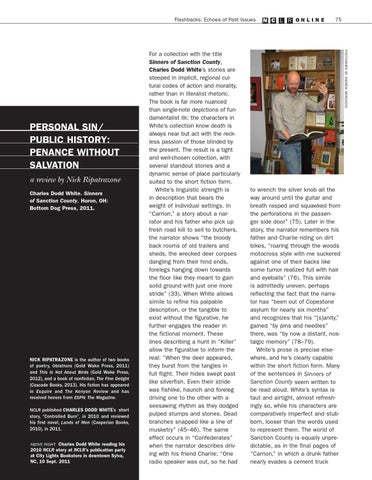Flashbacks: Echoes of Past Issues
a review by Nick Ripatrazone Charles Dodd White. Sinners of Sanction County. Huron, OH: Bottom Dog Press, 2011.
Nick Ripatrazone is the author of two books of poetry, Oblations (Gold Wake Press, 2011) and This Is Not About Birds (Gold Wake Press, 2012), and a book of nonfiction, The Fine Delight (Cascade Books, 2013). His fiction has appeared in Esquire and The Kenyon Review and has received honors from ESPN: The Magazine. NCLR published Charles Dodd White’s short story, “Controlled Burn”, in 2010 and reviewed his first novel, Lands of Men (Casperian Books, 2010), in 2011. ABOVE RIGHT Charles Dodd White reading his 2010 NCLR story at NCLR’s publication party at City Lights Bookstore in downtown Sylva, NC, 10 Sept. 2011
75
Photograph by Andrew Morehead
Personal Sin/ Public History: Penance without Salvation
For a collection with the title Sinners of Sanction County, Charles Dodd White’s stories are steeped in implicit, regional cultural codes of action and morality, rather than in literalist rhetoric. The book is far more nuanced than single-note depictions of fundamentalist ilk: the characters in White’s collection know death is always near but act with the reckless passion of those blinded by the present. The result is a tight and well-chosen collection, with several standout stories and a dynamic sense of place particularly suited to the short fiction form. White’s linguistic strength is in description that bears the weight of individual settings. In “Carrion,” a story about a narrator and his father who pick up fresh road kill to sell to butchers, the narrator shows “the bloody back rooms of old trailers and sheds, the wrecked deer corpses dangling from their hind ends, forelegs hanging down towards the floor like they meant to gain solid ground with just one more stride” (33). When White allows simile to refine his palpable description, or the tangible to exist without the figurative, he further engages the reader in the fictional moment. These lines describing a hunt in “Killer” allow the figurative to inform the real: “When the deer appeared, they burst from the tangles in full flight. Their hides swept past like silverfish. Even their stride was fishlike, haunch and foreleg driving one to the other with a seesawing rhythm as they dodged pulped stumps and stones. Dead branches snapped like a line of musketry” (45–46). The same effect occurs in “Confederates” when the narrator describes driving with his friend Charlie: “One radio speaker was out, so he had
N C L R ONLINE
to wrench the silver knob all the way around until the guitar and breath rasped and squawked from the perforations in the passenger side door” (75). Later in the story, the narrator remembers his father and Charlie riding on dirt bikes, “roaring through the woods motocross style with me suckered against one of their backs like some tumor realized full with hair and eyeballs” (76). This simile is admittedly uneven, perhaps reflecting the fact that the narrator has “been out of Copestone asylum for nearly six months” and recognizes that his “[s]anity,” gained “by pins and needles” there, was “by now a distant, nostalgic memory” (78–79). White’s prose is precise elsewhere, and he’s clearly capable within the short fiction form. Many of the sentences in Sinners of Sanction County seem written to be read aloud. White’s syntax is taut and airtight, almost refreshingly so, while his characters are comparatively imperfect and stubborn, looser than the words used to represent them. The world of Sanction County is equally unpredictable, as in the final pages of “Carrion,” in which a drunk father nearly evades a cement truck
